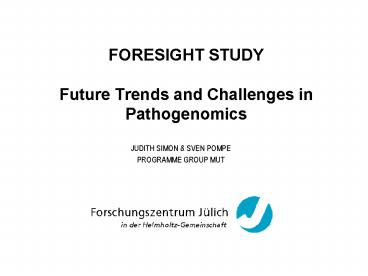FORESIGHT STUDY Future Trends and Challenges in Pathogenomics - PowerPoint PPT Presentation
1 / 26
Title:
FORESIGHT STUDY Future Trends and Challenges in Pathogenomics
Description:
Overview on future trends and challenges in research on human-pathogenic ... Analysis of host-pathogen-interaction. Identification of signaling pathways ... – PowerPoint PPT presentation
Number of Views:59
Avg rating:3.0/5.0
Title: FORESIGHT STUDY Future Trends and Challenges in Pathogenomics
1
FORESIGHT STUDYFuture Trends and Challenges in
Pathogenomics
- JUDITH SIMON SVEN POMPE
- PROGRAMME GROUP MUT
2
OBJECTIVES
- Overview on future trends and challenges in
research on human-pathogenic microorganisms
(bacteria fungi) - Developments in basic research
- Diagnostics therapy
- Public health
- Research co-operations
- Technology transfer market development
3
STRUCTURE
- Methods
- Literature internet research
- Preliminary assessment
- Expert survey
- Results
- Research foci
- Methods, diagnostics therapeutics
- Challenges for research
- Public health
- Co-operations
- Market development technology transfer
- Recommendations
- Discussion
4
METHODS
- Triangulation combination of literature and
internet research with expert survey interviews - "Triangulation ... reduces the risk of
systematic distortions inherent in the use of
only one method.
Maxwell 1998
5
METHODS Literature Research
- Databases
- PubMed
- Medline
- Important scientific journals
- Keywords combinations
- pathogenomics, infectious disease, public health,
bacteria, fungi, bioweapons, bioterrorism and/or
human-pathogenic - Focus on reviews
- Specialised articles on particular
micro-organisms were excluded
6
METHODS Internet Research
- Internet research on national international
- Surveys
- Experts
- Institutions
- Networks
7
METHODS Preliminary Assessment
- Addressee
- 62 members of the ERA-NET PathoGenoMics from 17
countries - Questions
- Contact partners and national institutions
- National main foci in microbiological research
- National newly emerging hot topics in
pathogenomics - Existing foresight studies on pathogenomics or
related subjects
8
METHODS Expert Survey
- Development and application of questionnaires
with questions on - Basic research
- Future prospects in diagnostics therapy
- Strengths and weaknesses in research
- Important cooperations and projects
- Technology transfer market development
- Public health
9
METHODS Expert Survey
A total of 329 experts was selected and contacted.
10
METHODS Expert Survey
11
RESULTS Research Foci
12
RESULTS Trends in Methodology
- Improvement of conventional methods
- Microscopy
- Serology
- Novel technologies
- High-throughput analyses
- Real time approaches
- Bioinformatics
- Omics
13
RESULTS Trends in Omics
- Systemic approach
Proteomics
Genomics
Transcriptomics
Metabolomics
14
RESULTS Trends in Omics
- Understanding of
- Infection
- Pathogenesis
Genomics Transcriptomics Proteomics Metabolomics
15
RESULTS Trends in Diagnostics
- Use of novel technologies
- PCR
- Sequence-based identification
- Molecular strain typing
- But tools need to be more ...
- rapid
- sensitive
- specific
- robust
- affordable
16
RESULTS Challenges for Therapeutics
- Extension of databases discovery of molecular
strategies - In order to ...
- enable comprehensive statistical and comparative
analyses - standardise validate diagnostics
- find novel targets
- develop new vaccines
- innovate antibiotic intervention
- individualise therapy
17
RESULTS Challenges for Research
- Multidisciplinary research on
- Ecology environment
- Population dynamics
- Evolution taxonomy
- Epidemiology
- Risk assessment
18
RESULTS Challenges for Research
- Basic research on infection pathogenesis
- Analysis of host-pathogen-interaction
- Identification of signaling pathways
- Analysis of metabolic interactions
- Identification of virulence factors
- Target identification
- ...
19
RESULTS Public Health - Risks
- Major risks are
- Multidrug resistance (cf. tuberculosis)
- Nosocomial infections
- Bioterrorism
20
RESULTS Public Health Measures
- Surveillance systems
- Action plans for emergencies
- Vaccination strategies
- Rapid and early diagnostics
21
RESULTS Co-operations
What are the most important research partners for
scientists in pathogenomics?
22
RESULTS Market Development Technology
Transfer
- Barriers
- High RD costs
- Limited market size for vaccines and antibiotic
products compared to the market for diseases of
civilisation
- Opportunities
- Public-private partnerships
- Subcontracting with SMEs for preclinical studies
- Public funding for orphan drugs
23
RECOMMENDATIONS
- 1. Establish a European surveillance system
- 2. Reduce the misuse of pesticides in
agriculture and animal technology - 3. Create a European Competence Center for
epidemiological research and modelling - 4. Create an RD programme that is specifically
tailored to support public-private partnerships - 5. Create structures for early warning and rapid
response to emergencies
24
RECOMMENDATIONS
- 6. Develop comparative risk assessment
strategies for setting national health
priorities - 7. Reconsider work-sharing between research
institutes and universities - 8. Foster cooperations between microbiological
researchers and clinicians - 9. Foster inclusion of ecological aspects into
microbiology - 10. Improve transparency about the function of
different networks on pathogenomics - 11. Conduct a study on industrial research
objectives and economic interests
25
- THANK YOU VERY MUCH
- FOR YOUR ATTENTION!
- The complete report on
- FUTURE TRENDS AND CHALLENGES
- IN PATHOGENOMICS
- will soon be available at
- http//www.pathogenomics-era.net
26
RECOMMENDATIONS
- 1. Establish a European surveillance system
- 2. Reduce the misuse of pesticides in
agriculture and animal technology - 3. Create a European Competence Center for
epidemiological research and modelling - 4. Create an RD programme that is specifically
tailored to support public-private partnerships - 5. Create structures for early warning and rapid
response to emergencies - 6. Develop comparative risk assessment
strategies for setting national health
priorities - 7. Reconsider work-sharing between research
institutes and universities - 8. Foster cooperations between microbiological
researchers and clinicians - 9. Foster inclusion of ecological aspects into
microbiology - 10. Improve transparency about the function of
different networks on pathogenomics - 11. Conduct a study on industrial research
objectives and economic interests































